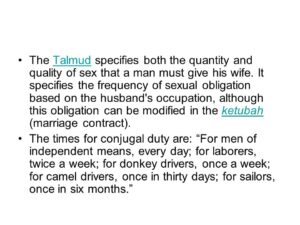Raboyseyee and Ladies,
Mandated Conjugal Relations:
Today marks the 19th yurtzeit since the passing of my father, Reb Yaakov ben Chaim Yitzchok Halevi Grossman, OBM; may his neshomo have continued aliyos. He would – I think- have been happily surprised to see what his son turns out weekly for the past 13 years.
Yesterday, after a trip the cemetery, the Ois made his way to the Romer Shul in Teaneck New Jersey to chap a mincha / maariv and is thankful to the gentleman who offered me the omud. Nothing like a nice friendly shul; kudos!
From there, the Ois made his way over to the Meadowlands Hilton to wish a mazel tov to Devorah and Uri Dreifus. Some 28-30 years back the Ois had the pleasure of speaking at Devorah and Uri’s sheva brochis and shoin. A big mazel tov to Eli Dreifus upon his marriage to Esther Wilheim, she the beautiful daughter of Dina and Ronnie Wilheim. Mazel tov to both extended families. The Ois has known Devorah -then still Jeger- since birth, her parents Rochelle and Dr. Moish Jeger since 1969. We have been friends for decades. May Esther and Eli be zoche to enjoy many blissful decades together.
From there, the Ois drove to Crown Heights, where he joined the wedding of Chana Tova Popack who married Shaya Zakon. Chana Tova is the beautiful daughter of Yossie and Penina Popack. The Ois has known Yossie Popack since 1973; hec, we even shared a room one shabbis over in Camp Gan Yisroel. A big mazel tov to the entire extended Popack family and may the young couple merit to enjoy only good times together.
This coming Sunday evening the shloshim for Malky Newberg, A’H will be observed. Only twice in the past 13 years has the Ois ever shouted out the passing of a family member or someone he knew and was close to. Malky Newberg wasn’t family, but she was a really special person. May her neshomo have an aliya.
The heylige Ois and eishes chayil are back from Panama where they mamish enjoyed every minute of every day. Raboyseyee, if you haven’t been, you need to go! If you desire kosher food while traveling -avada you should not compromise while traveling- Panama offers approximately 45 different options. Hec, there’s kosher at the Panama Canal and elsewhere. If you need a shul, there are five to pick from in the city. Chabad and others have additional shuls in other parts of the country as well. It’s mamish amazing. And if you’re nervous about donning your yarmulka when traveling abroad and don’t enjoy wearing a cap, Panama is mamish safe. You can wear it safely day and night. The Yiddin are respected and revered. Go now!

Shoin, the fun, games, and adventures of the past few weeks are over. The Yiddin have witnessed many miracles: plagues, their enslavers suddenly letting them borrow –permanently- all sorts of valuables to include gold, silver and even clothing. Freedom, splitting of the sea, sweet potable water in the desert, and mun food falling from the sky. Life was good; the dating with the RBSO was going well, they were contemplating marriage.
And taka in last week’s parsha, some 50 days after being freed from slavery, the Yiddin did just that; metaphorically avada, they married the RBSO and accepted Him as their new Master. Did they act impetuously? Why would a nation of people who suffered so as slaves under Paroy be so willing to accept a new boss along with His heylige Toirah and all its restrictions? Ver veyst? Is it shayich that they said yes -we will do and listen- without thinking things over? Were they given details of life post marriage? Or, were they forced into the marriage kicking and screaming? Grada there is an opinion suggesting that they were, and only in connection with the Purim story –following the miracles Esther pulled off -reaching out and touching the royal scepter, if you chap, certainly helped- did they willingly accept the RBSO’s heylige Toirah; that topic for another day. The bottom line: good things happen when the royal scepter gets touched. More on touching and more-much- below. The heylige Gemora (Shabbis 88a) tells us the RBSO held a mountain over their heads and gave them an ultimatum.
This week: The newly married Yiddin are about to hear the details of their wedding vows. Moishe begins this week’s parsha of Mishpotim with a surprise topic, Jewish slavery! OMG! Slavery? Nuch-a-mul (again)? Was slavery the most appropriate topic to begin with? Were the Yiddin ready to discuss so painful a topic? Why not ease them into the 613 commandments? Logic would dictate that after 210 years of slavery in Mitzrayim, the last thing the Yiddin would want to hear from Moishe was more slave talk. Ober as our parsha opens, what is being discussed? What are the first ever rules given by the RBSO post Revelation? How to celebrate upcoming yomim tovim (holidays)? Not! Marriage, divorce? Also not! The Ois can think of many a mitzvah –positive and even negative- to have begun with; why jump into a topic still very much fresh and sore? Then again, who are we to tell the RBSO in which order the mitzvos should be given? Veyter!
Though our parsha contains 53 (so says the Sefer Hachinuch, Rambam disagrees) new laws, for reasons we don’t chap –maybe it’s none of our business- the RBSO decided that slavery might be an interesting topic to lead with. One of the laws is of interest this week and is being covered for the very first time.
It’s emes that this week’s parsha is Mishpotim. Ober, we must begin by harkening back to the very end of Parshas Vayetzei where we were introduced to a new word. That word, in a slightly different form- makes an appearance in our parsha and our rabbis were all hot under the collar -and efsher elsewhere, if you chap- when discussing it. What is that word and what happened back in Vayetzei? Let’s find out.
After siring twelve kinderlach and being fooled by shver Lovon, Yaakov had enough of his uncle’s (also his father-in-law) shenanigans. In the middle of the night, he left with his four wives, dozen plus kids and all else. The uncle was not a happy camper, gave chase and they had a shtikel encounter. Ober just before the meeting, the RBSO appeared to Lovon and warned him not to harm Yaakov who was now on his way to becoming Yaakov Oveenu (our forefather). Instead, when Lovon approached he warned Yaakov not to withhold sexual favors from his daughters. He did what? Really? Is this mamish in the heylige Toirah? Say it’s not so but it is. Nu, the emes is that Rashi -who else- provides some color, not that it’s needed. Rashi is quoted in the box below tell us what the word means. Ober before you get to the second shaded box, let’s look at the first which contains yet another bombshell, mamish.
| 50. If you afflict my daughters, or if you take wives in addition to my daughters when no one is with us, behold! G-d is a witness between me and you.” | נ. אִם תְּעַנֶּה אֶת בְּנֹתַי וְאִם תִּקַּח נָשִׁים עַל בְּנֹתַי אֵין אִישׁ עִמָּנוּ רְאֵה אֱ־לֹהִים עֵד בֵּינִי וּבֵינֶךָ: | |
| …my daughters…my daughters: Twice. Bilhah and Zilpah were also his daughters from a concubine. — [from Pirkeid’Rabbi Eliezer, ch. 36] | בנתי בנתי: שתי פעמים, אף בלהה וזלפה בנותיו היו מפלגש: | |
| If you afflict my daughters: By depriving them of their conjugal rights (Yoma 77). | אם תענה את בנתי: למנוע מהם עונת תשמיש: |
The bottom line: according to Pirekei d Rebbe Eliezer and others as we shall read below- the word ti’an’neh seemingly refers to affliction and when one withholds sexual favors from a woman, he is afflicting her. It so happens that more women -many more-afflict their husbands then do men afflict their wives. Shoin, more on that another day (unless the eishes chayil reads what I wrote in which case, there might not be another day.)
The word of the day in Vayetzei was תענה (Ti-ah-neh) highlighted above in the Hebrew. In English -also as seen above- it translates to afflict. Rashi quoting the heylige Gemora in Yuma (77b) concludes that withholding cohabitation -sexual favors- is mamish an affliction and tells us that Lovon warned Yaakov not to deprive his daughters from conjugal visits. You hear this? He was warned by Lovon not to diminish nor withhold conjugal visits from each of his daughters. That’s what I call an excellent father-in-law! Has your father-in-law ever sat you down and warned you about not delivering the goods? Mistama not! And the connection to our parsha?

Nu, it so happens that a similar topic and almost similar circumstances- though of course not exactly alike- can be found in our parsha. Let’s learn veyter. The heylige Gemora asks azoy:
תַּשְׁמִישׁ הַמִּטָּה דְּאִיקְּרִי עִנּוּי מְנָא לַן? דִּכְתִיב: ״אִם תְּעַנֶּה אֶת בְּנוֹתַי וְאִם תִּקַּח נָשִׁים
From where do we derive the halocho that refraining from conjugal relations is called affliction? Answer: As it is written, Lovon (Laban) said to Yaakov: “If you shall afflict my daughters, and if you shall take other wives beside my daughters” (Bereishis 31:50). Wait! The Gemora has more to say:
״אִם תְּעַנֶּה״ — מִתַּשְׁמִישׁ, ״וְאִם תִּקַּח״ — מִצָּרוֹת. וְאֵימָא אִידֵּי וְאִידֵּי מִצָּרוֹת? מִי כְּתִיב ״אִם תִּקַּח״? ״וְאִם
תִּקַּח״ כְּתִיב.
This can be explained azoy: “If you shall afflict my daughters” by refraining from conjugal relations, “and if you shall take other wives” causing them to suffer from additional rival wives. The heylige Gemora objects: And say that this phrase and that phrase are both referring to taking rival wives. The Gemora rejects this: Is it written: If you take? “And if you shall take” is written. Therefore, the clauses must be referring to two different kinds of affliction.
אֲמַר לֵיהּ רַב פָּפָּא לְאַבָּיֵי: הָא תַּשְׁמִישׁ גּוּפֵהּ אִיקְּרִי עִנּוּי, דִּכְתִיב: ״וַיִּשְׁכַּב אוֹתָהּ וַיְעַנֶּהָ״! אֲמַר לֵיהּ: הָתָם שֶׁעִינָּהּ מִבִּיאוֹת אֲחֵרוֹת.
Rav Pappa said to Abaye: But conjugal relations themselves are called affliction, as it is written: “And Shechem the son of Chamor the Hivite, the prince of the land, saw her; and he took her, and he lay with her and afflicted her” (Bereishis 34:2). If so, how can it be said that the affliction is in withholding conjugal relations? He said to him: There, Shechem afflicted her from different relations, meaning he slept with her in an unnatural way, chazir that he was. That type of relations is clearly an affliction.
The bottom line: ti-ah-nah refers to the afflicting of a woman by depriving her of her well-deserved sexual needs. Shoin, now that we learned the heylige Gemora, let’s play connect the dots. In this week’s parsha, among the 53 commandments -let’s call them the fine print of the marriage between them and the RBSO, during the discussion of slavery to which 10 pisukim are dedicated, we find this posik: “He shall not withhold she’erah, kesutah, or oinoso.”
שׁמות כא:י אִם אַחֶרֶת יִקַּח לוֹ שְׁאֵרָהּ כְּסוּתָהּ וְעֹנָתָהּ לֹא יִגְרָע.
Let’s explain: If he -the slave master husband- marries another, he must not withhold her [his first wife’s] food, clothing, or oinah. Ok, what’s happening here? Nu, it so happens that the heylige Toirah, among the first laws taught following Matan Toirah (Revelation) has this to teach us: It requires a man -commands is the operative term- who marries his maidservant, to treat her as a wife, providing her with food, clothing, and oinah, a term that has been interpreted -depending which sage talks to you- as shelter, anointing oil, or conjugal rights. It so happens that the latter is the traditional accepted pshat. Well, blow me down.
Ober what are these three things that the husband is responsible for? Following one view in the heylige Gemora (Kesuvis (48a), she’erah refers to flesh-to-flesh contact during intimacy, kesusah, to the bed and bedding used by the couple during intimacy, and oinoso refers to the conjugal act itself. Amazing and wow! Ober, Rashi (ad loc.), following a different view in the heylige Gemora (loc. cit.), interprets she’erah as “her food,” kesusah as “her clothing,” and oinoso as the conjugal act. Bottom line: all agree that the mitzva of oina is the essence of marriage, as it gives expression to the couple’s complete love for one another.

Wait, there’s more: While all agree that the husband is obligated (from the Toirah mamish) to provide for his wife sexually, there is disagreement about his obligation to provide her with food and clothing. According to one view, this obligation is not stated explicitly in the Toirah, but our sages ordained so, because without these basic needs a couple cannot truly enjoy the mitzva of oina. Seemingly, oina goes down better after a good meal. Moreover, a key component of true love for one’s spouse is a very deep-rooted feeling of responsibility for their well-being and best interest. Thus, it is inconceivable that a husband who truly loves his wife would not make sure to feed and clothe her; if he does not do so, clearly there is no real love in their sexual relations. The bottom line: shopping plus a good meal seemingly leads to be better oina! Who would argue differently? According to the other view, the heylige Toirah itself explicitly mandates that the husband see to his wife’s food and clothing. Even though the mitzva of oina is the most profound expression of a marriage, a wholesome relationship must, by definition, include his full responsibility for her food and clothing.
Emphasizes Rashi (21: 10-2), azoy: HER FOOD, HER RAIMENT AND THE MARITAL DUTY SHALL HE NOT WITHHOLD: from whom? From the maidservant whom he has already designated as his wife. שארה כסותה וענתה לא יגרע. Veyter.
In fact, Jewish men obligate themselves to the delivery of such services when they sign the kisuvah. The language of the husband’s declaration in the traditional kisuvah [marriage contract], reflects these three duties: [I will provide] your food, clothing and necessities, and I will approach you [sexually] in the standard manner. The bottom line: man is obligated to “approach” and satisfy his wife’s sexual needs. Sadly, many Jewish women were taught not to have such needs or desires; that topic for another day. מזונייכי וכסותייכי וספוקייכי ומיעל לותיכי כאורח כל ארעא

The classical rabbinic understanding of the phrase “approaching her” is how all the Michilta (Nezikin 3; b. Kesuvis 47b) and most other exegetes render the term oina. They are the wife’s “conjugal rights.” The bottom line: the phrase שאר כסות ועונה became common in rabbinic literature. Withholding any of them is a big no-no listed as negative commandment #262 in the Rambam’s Sefer ha-Mitzvis. Another bottom line: before centuries before Amazon Prime offered expedited delivery, men were obligated to be available in prime time, or whenever the wives needed some satisfaction. Most men would gladly make such deliveries. Case closed?

Not so fast because says the Rashbam, typically known for his logical approaches, that the term oina actually means shelter. The man is obligated to provide shelter. The list of three obligations—food, clothing, and shelter—makes sense: All three require a financial outlay and provide for basic human needs. In other words, the rejected bride must be provided food, living quarters and adequate clothing. All of the above would have been hers automatically if her master had honored his original undertaking. Particularly, as the biblical text applies this list to a Hebrew maidservant, of whom the master may tire and feel he can remove with impunity, the merit of this explanation is clear. Seemingly, many women hold like the Rashbam.
Any others? Indeed, and let us check out the Shadal (Samuel David Luzzatto) who happens to mention the Rashbam’s pshat, but concludes and defends the traditional rabbinic one: I say that “her oina” refers to the duties toward her inasmuch as she is a married woman, and this must be a reference to sexual intercourse.
אומר אני כי “וענתה” הוא התנאי הראוי לה במה שהיא אשה בעולת בעל והתנאי הזה הוא התשמיש בלא ספק.
And says the Tur HaArokh, (Shmois 21:10:4), azoy: לא יגרע, “he must not diminish.” He must not marry another woman in addition, and thereby reduce this former servant’s status to that of a concubine both in appearance and by her reduced conjugal rights The second wife is not to sit on the bed of the first wife, thereby causing her mental anguish. Any marriage to an additional wife must not be at the expense of the first wife. And says the Ibn Ezra, the meaning of “and her oina” is sexual activity, also known as “the time of lovemaking.” ופי וענתה על המשכב שהוא “עֵת דֹּדִים
Want more: says the Radak in his Sefer ha-shorashim, s.v. עון azoy: the heylige Toirah appropriately uses a word that relates to a “fixed time” to refer to sexual activity, since Mishnaic law legislates the frequency of sexual activity required for a man to fulfil this mitzvah. Mamish? Check out the heylige Gemora (Kesuvis 5:6) for a mandated schedule of sexual activity between man and his wife.

And now you know!
A gittin Shabbis-
The Heylige Oisvorfer Ruv
Yitz Grossman
